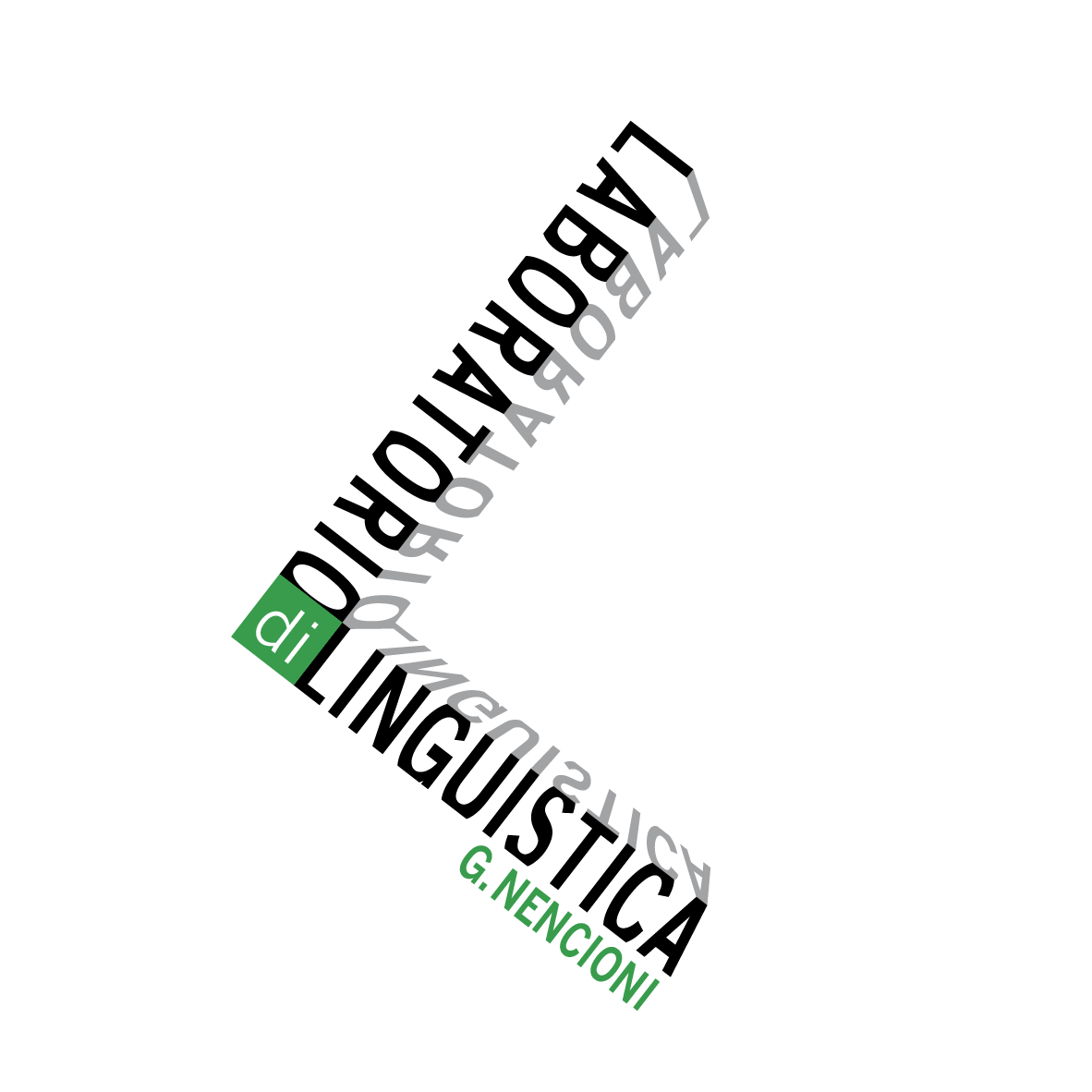Laboratorio di Linguistica
'Giovanni Nencioni'
'Giovanni Nencioni'
Abstract
June 16th
Koji Kawahara. Aspects of Motion Events from a Typological Perspective
Anna Riccio. Analyzing Italian Motion Verbs within the RRG framework: the Causative Active Accomplishments
Yulia Zinova and Rainer Osswald. The composition of aspect and path in Russian motion expressions
Descles Jean-Pierre and Guentchéva Zlatka. Concept d’état et typologie des états
Dorota Sikora. D’achèvement à état : une affaire de polysémie
Francesca Strik Lievers. ‘Remain’ verbs in Romance. A case of state / transition polysemy
Bridget Copley. Future reference: Exploring the hypothesis space.
Alda Mari. Future and Information (Italian and French in contrast).
Brenda Laca. Future conjectures: losing confidence
Vittorio Tantucci. Interpersonal Evidentiality (IE): The Mandarin v-guo construction and other evidential functions of ‘shared knowledge’
Ana Arregui, Maria Luisa Rivero and Andres Pablo Salanova. Aspect and temporal relations in Evidentials.
Swintha Danielsen. Realis/irrealis as basic grammatical distinction in some Southern Arawakan languages
Luca Ciucci. Realis and irrealis in the Zamucoan languages (Main Sessions: mood/modality)
Marine Vuillermet. The grammar of fear in Ese’eja
Laura Horváth. Habituality in Udmurt
Antonio Fábregas and Rafael Marín. Frequentative adjectives and silent temporoaspectual variables in DPs
Raquel González. The negation of resultative periphrasis
Jacques Moeschler. French Historical present, narration and subjectivity: A pragmatic account
Cristina Grisot and Michele Costagliola D'Abele. What do translation corpora tell us about the semantics and pragmatics of tense? The case of the English preterit
Sandra Lhafi. À propos du rendement textuel du plus-que-parfait
Sergei Tatevosov. Result states and their descriptive properties: on the meaning of some prefixes in Russian
Olga Batiukova. Event structure and lexical semantics in a scalar approach to actionality
Anna Alexandrova. Towards a diachronic analysis of actionality in Old Russian
Peter Arkadiev. A multifactorial areal-typological approach to prefixal perfective in the languages of europe and the caucasus
Eleni Staraki. The Spectrum of Future
Louis de Saussure and Laura Baranzini. Weak and strong epistemic meanings of the Future tense(s) in French and Italian.
Joana Portia Sakyi. Interface of the Akan Future Tense Marker ‘Bε-’ and Modality
Signe Rix Berthelin. On the modality of modal particles – the case of Norwegian 'jo'
Martina Faller. What kind of non-at-issue operator is the Quechua Reportative?
Elisabetta Ragagnin. Siberian Turkic complex evidential systems
Anna Daugavet. Acquisitive modals in Latvian
Cécile Barbet. All modal verbs are not made equal
Abdallah El Mountassir. L’expression de l’ordre en tachelhit. Langue berbère du sud du Maroc
Marta Donazzan and Lucia Tovena. Aspecual classes in event nouns: plurality and unity of events
Marcus Tanaka de Lira. Tense and Tendencies: TMA morphology outside the verb
Olga Kellert. From NPIs to Modal Particles
Lucie Barque, Marie Candito and Philippe Muller. Annotation temporelle en sémantique des cadres
June 17th
Zsofia Gyarmathy. Scale coercion and the progressive form of achievements
Antonio Fábregas. WHEN, HOW AND WHY ‘STATE + PERFECTIVE = ACHIEVEMENT’
Jiyoung Choi. On the puzzling class of so-called inchoative states in Korean
Christiane v. Stutterheim, Abbassia Bouhaous , Mary Carroll, Monique Flecken & Johannes Gerwien Psycholinguistic insights on aspect: the case of Tunisian and Modern Standard Arabic
Silvia Natale. Progressive aspect in Italian: findings from a ‘developing’ aspect system.
Angeliek van Hout, Natalia Gagarina and Wolfgang Dressler plus 25 more authors. Learning to produce and understand aspect across languages
Daniel Altshuler and Hana Filip. Perfectivity as maximization over event stages
Roberta Pires de Oliveira and Renato Basso. Perfective, and Telicity in Brazilian Portuguese
A. Giannakidou, A. Mari. Future and evaluation
Marketa Janebova. A contrastive view of will and be going to and their czech translation equivalents
Naoaki Wada. A temporal structure-based analysis of the 'be to'-construction
Bjoern Rothstein. On the perfect-evidential-link in Continental Scandinavian
Adeline Patard. From perfect aspect to counterfactuality : the semantic evolution of the conditionnel passé in French
Laura Baranzini and Claudia Ricci. L’imperfection n’est pas de ce monde : remarques contrastives sur l’imparfait contrefactuel en français et en italien
Pauline Haas and P. Gréa. « Cet événement n’aurait pas eu lieu si Jean n’avait pas effectué cette action », avoir lieu et effectuer : verbes supports de dynamicité
Ileana Paul and Henriëtte de Swart. Telic predicates and achievements in Malagasy: Evidence from number neutrality
Kazuhiko Fukushima. Aspectual Composition and Japanese V-V Compounds: the Role of Telic Verbs as Spoilers
Toshiyuki Ogihara. Achievement in Japanese — Theoretical Implications
M. Flecken, J. Gerwien. Grammatical aspect influences event duration.
Jeruen E. Dery and Dagmar Bittner. Temporal proximity between causes and effects influences patterns of causal attribution
Isabel García Del Real. Children’s non adult-like comprehension of PF and IPF morphology: semantics of pragmatics?
Galia Hatav. Perfective, Counter-perfective and Non-perfective
Jukka Havu and Elenn Știrbu. Les temps perfectifs dans la narration littéraire en roumain
Gilles Authier and Ayten Babaliyeva. “Entre dérivation et flexion: les preverbes locatifs et perfectifs du tabasaran littéraire"
Louis De Saussure. Inferential evidentiality with epistemic modality. A pragmatic stance.
Teresa Oliveira. Evidential strategies in European and Brazilian Portuguese translations: a case study
Stephanie Russo. Current relevance and focus marking in French and Spanish perfects
Angeles Carrasco. On the characterization of the Perfect as a stativizing device
A. Meermann Auxiliary variation in Serbian – a missing link of evolution of the perfect in Slavic.
Bourguiba Abir The subjunctive in the electronic Italian press: a mode in danger ?
Lucio Melazzo. The origin of diathesis
Joanna Blochowiak. The knotty problem of temporal and causal interpretations of 'and'
Eugenio Civardi and Pier Marco Bertinetto. The semantics of Degree Verbs
Richard Huyghe. Les "achèvements graduels" en français: des verbes aux noms
Livio Gaeta. What’s in a verbal noun? Achievements and nominalizations in Romance
Edith Scheifele. German "Perfekt": Activation of the Resultant State?
Mihajlo Ignjatovic. Stages of Events in the Semantics of the Progressive
Karoly Varasdi. A Contrastivist approach to the progressive
Renato Basso and Roberta Pires de Oliveira. Semantics Aspects of the Perfective Progressive Periphrasis in Brazilian Portuguese
Susan Rothstein and Fred Landman. Habituals and the Progressive
Zlatka Guentcheva and Jean-Pierre Desclés. ‘Evidentiality’ ou médiativité ?
Johanna Miecznikowski and Elena Musi. Perception predicates used inferentially: the example of Italian vedere and sembrare
Jacques Bres and Yordanka Levie. (Ad)miratif en bulgare et allure extraordinaire en français
Reili Argus and Anne Tamm. Evidentials under the paw of the Russian bear
G. Fløgstad
Tatjana Zybatow and Thomas Weskott. Double Perfect Forms in German: Theoretical Considerations and Empirical Evidence
Tom Durand. L'influence de l'aspect sur l'alignement dans les langues arawak
Ekaterina Sergeeva. Taxis Constructions In Komi Zyrian Standard Language
Barbara Lewandowska-Tomaszczyk. Mental scanning of events: Temporal and aspectual properties of participial modification in Polish and English
Joseph Dalbera. Fonctions de l’infinitif dans la narration en latin
June 18th
Liina Pylkkänen. Current perspectives on neuromagnetic activity correlated with coercion.
Julia Lukassek. The Aktionsart of German Phase Verbs
Moukrim Samira. Les aspects « grammatical », « lexical » et « phasal » en berbère
Alice Ter Meulen. Thematic roles, aspect and the ACH.
Bridget Copley and Phillip Wolff. Non-culmination and agency: Exploring the hypothesis space
Carmela Toews. Teasing Apart Past Tense and Perfective Aspect: Evidence from Siamou
Katerina Konstantzou, Angeliek van Hout and Spyridoula Varlokosta. Asymmetrical development of grammatical aspect: Evidence from typical development and specific language impairment
Laurent David. Identifying and tracing a cognitive pathway in children’s first uses of the present perfect
Elisa Ghia, Caterina Mauri, Malvina Nissim, Paola Pietrandrea and Andrea Sansò. Annotating modality cross-linguistically: theory, practice, problems
Yoshiki Mori and Shinya Okano. On abductive uses of Japanese "hazu"
E. Mattew Husband and Fernanda Ferreira. Distinguishing two routes to silent meaning in the brain
Frauke Buscher, Britta Stolterfoht and Robin Hörnig. Syntactic and information-structural influences on coercion
Emmanuelle Labeau and Jacques Bres. Venir à + infinitif en français : grammaticalisation et rémanence du signifié de verbe de déplacement déictique
Alida Maria Silletti. Les valeurs d’aller + infinitif et sa traduction en italien
L. Bar-El. The Agent Control Hypothesis and the inventory of aspectual classes
Igor Vinogradov. The temporal and modal semantics of the perfective/imperfective distinction in Tzotzil (Mayan)
Astrid De Wit and Frank Brisard. The temporal interpretation of the present perfective in creoles and North-Slavic - Two different solutions to the same problem
Aoife Ahern, José Amenós and Pedro Guijarro-Fuentes. SEMANTIC AND PRAGMATIC FACTORS IN L1 AND L2 MOOD INTERPRETATION
Laura Wagner. The Influence of Typological Organization on Children’s Temporal Understanding
Hans Kronning. Le rôle des temps verbaux dans les constructions conditionnelles prédictives en 'si'
Axelle Vatrican and Ana Bravo. On the non-temporal conditionals in Spanish: Semantics of self-licensing contexts
Patrick Caudal and Barbara Hemforth. Coercion types in French : an experimental study
Olga Batiukova, Pier Marco Bertinetto, Alessandro Lenci, Alessandra Zarcone and Irene Ricci. Priming-based study of durativity and resultativity in Spanish and Italian
Markus Philipp, Sven Alberg and Beatrice Primus. Agentivity, Animacy and Telicity: Event Coercion in Intransitive Clauses
David Townsend. Eye Movements Reveal Mechanisms of Event Coercion
Aude Rebotier. Le Futur périphrastique français : un autre futur ?
Hava Bat-Zeev Shyldkrot. Venir à /venir de : complémentarité ou neutralisation
Philippe Bourdin. Il convient de + inf.: a weak periphrasis for a weak form of necessity
J-P. Koenig A shopping guide to variations in event realization
Christopher Piñón. Reconsidering defeasible causative verbs
María J. Arche. Viewpoint aspect and agent control in Spanish non-culminating accomplishments
Helen Arnot. Inclusion of English Phasal Aspect into Zeisler’s Onomasiological Framework for Aspectual Systems in Language
Irene Gorbunova. Atayal as a tenseless language
Martin Kohlberger. Shiwiar Aspect Markers: A Case of Aspectual Bleaching?
Cecilia Mihaela Popescu. Remarques sur le ‘futur épistémique inférentiel’ dans une perspective typologique romane
Corinne Rossari, Claudia Ricci and Elena Siminiciuc. Interfaces between lexical meaning, rhetorical values and commitment: The case of the future in French, Italian and Romanian
Lotfi Abouda and Marie Skrovec. Quel avenir pour le futur ? Étude sur un corpus oral diachronique.
Sophie Azzopardi and Jacques Bres. Quand le futur ne porte pas sur le procès qu’il actualise : futur d’énonciation et futur de découverte
Jacqueline Gueron. Perfect Parameters
Karina Molsing. Perfect plurality without pluractionality
Dmitry Gerasimov, Yury Lander and Peter Arkadiev. Peculiarities of past time reference in Circassian
Suying Yang. The Distribution of Aspect Markers and Aspectual Verb Types in Chinese
Negin Ilkhanipour. Telicity in Persian complex predicates with šodæn
Lareina Milambiling. Non-volitional Tagalog verbs: Achievements, Accomplishments, or both?


